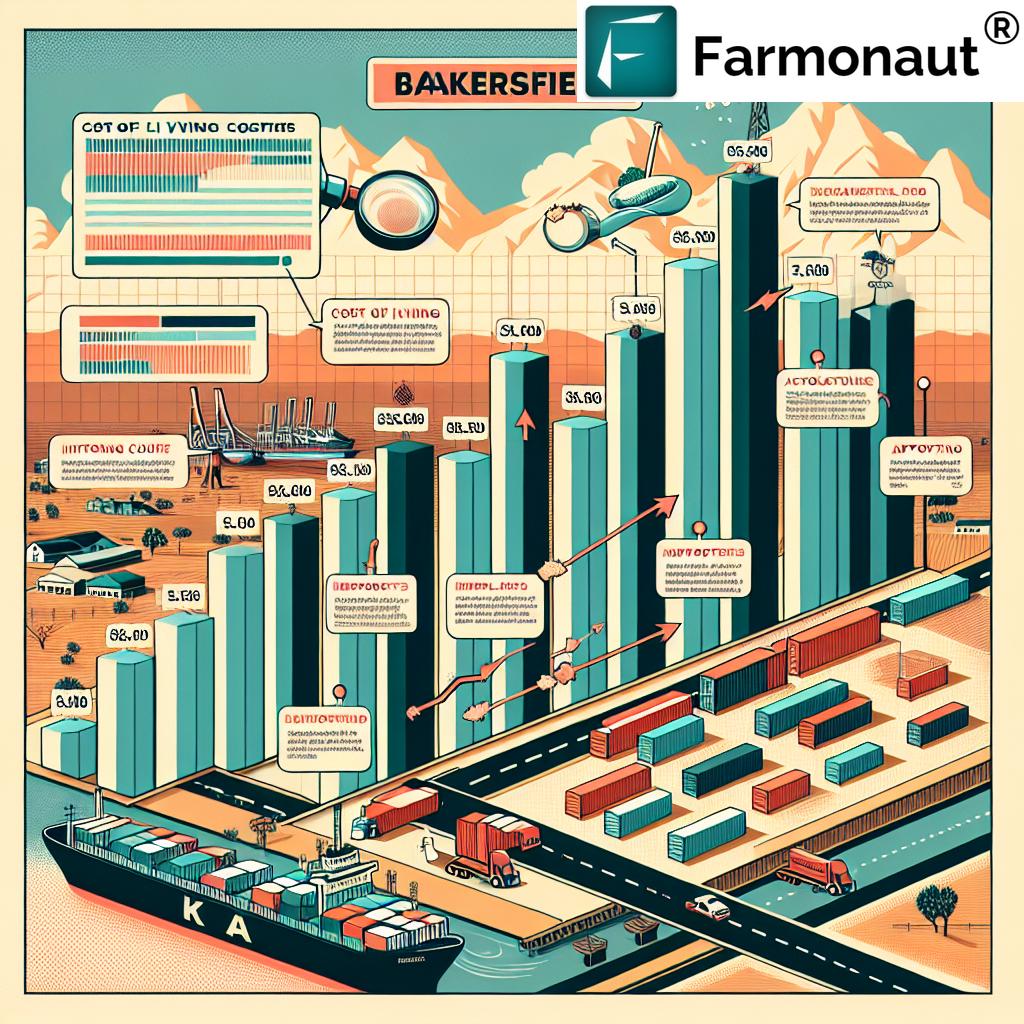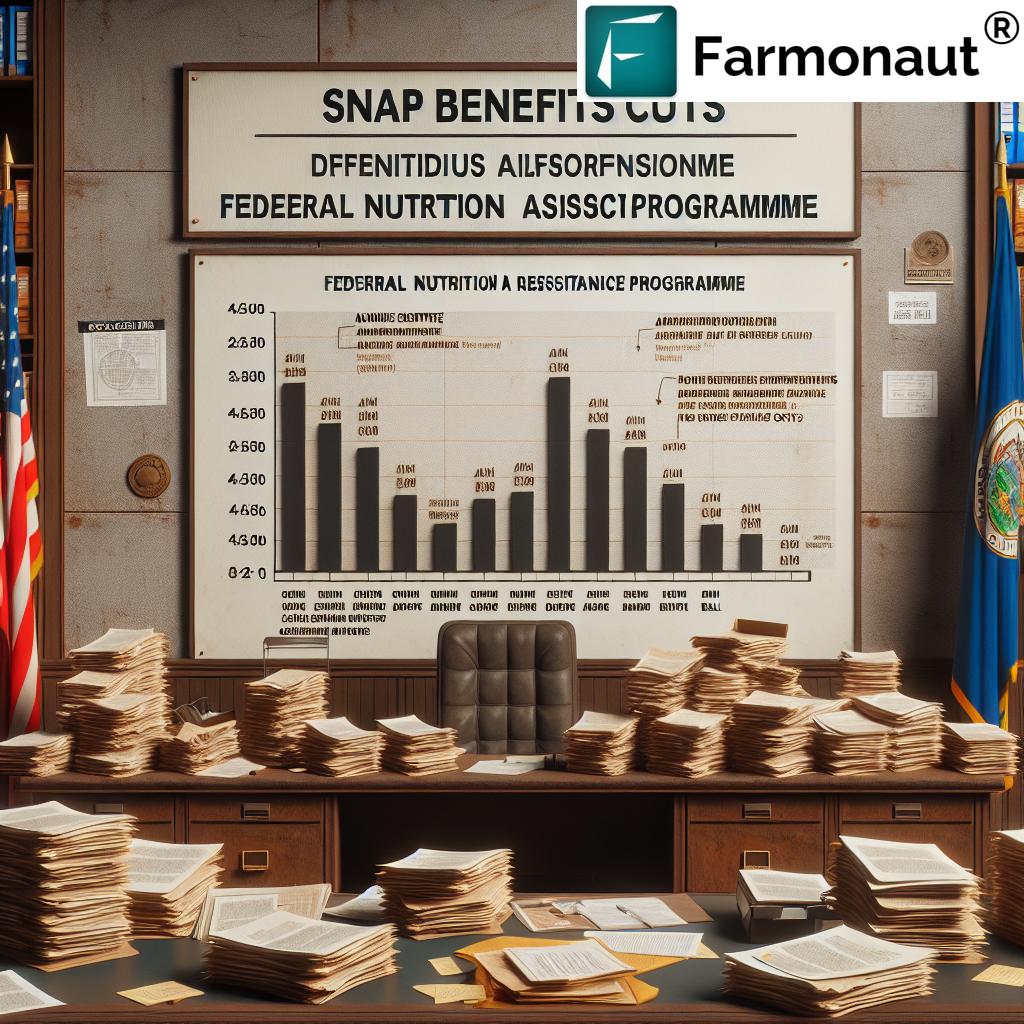Bakersfield’s Economic Strain: How Tariffs Are Impacting California’s Agriculture and Cost of Living
“California’s new 10% universal tariff could impact over $400 billion worth of annual imports, affecting various industries statewide.”
As we delve into the complex world of international trade and its effects on our local economy, we find ourselves at a critical juncture in Bakersfield and Kern County’s economic landscape. The recent implementation of new tariffs by President Trump has sent ripples through California’s agricultural heartland, raising concerns about potential economic strain and rising costs. In this comprehensive analysis, we’ll explore how these tariffs are reshaping our economic future and what it means for your financial well-being.
Understanding the New Tariff Landscape
The new 10% universal tariff across all U.S. trade partners, set to take effect on April 5th, marks a significant shift in America’s trade policy. This blanket approach to tariffs is designed to revitalize American manufacturing and address trade imbalances. However, the immediate impact on California’s economy, particularly in agriculture-rich regions like Bakersfield and Kern County, is causing concern among economists and local experts.
Richard Gearhart, Associate Professor of Economics at Cal State Bakersfield, warns that this could be “about the worst case scenario in terms of tariffs.” The potential for stagflation – a combination of slow economic growth and high inflation – looms large over our state’s financial future.
The Agricultural Sector: A Primary Concern
California’s agricultural industry, a cornerstone of our state’s economy, stands to face significant challenges from these new tariffs. As a major exporter of agricultural products, our farmers are particularly vulnerable to retaliatory tariffs from foreign trade partners.
- Potential for massive subsidy payments to farmers
- Risk of reduced export opportunities
- Increased costs for agricultural inputs
Gearhart estimates that subsidy payments to farmers could reach as high as $50 to $75 billion, far exceeding the $23 billion paid out during the 2018 trade war with China. This financial burden on the government could have far-reaching consequences for our national budget and economy.

For farmers in Bakersfield and Kern County, the implications are dire. The potential loss of export markets could lead to oversupply in domestic markets, driving down prices and profitability. Moreover, increased costs for imported agricultural inputs like fertilizers and machinery could squeeze profit margins even further.
In these challenging times, farmers may need to explore innovative solutions to maintain their competitiveness. One such solution is Farmonaut’s crop plantation and forest advisory services, which offer data-driven insights to optimize crop health and yield. By leveraging satellite technology and AI, farmers can make more informed decisions about resource allocation and crop management, potentially mitigating some of the economic pressures brought on by the tariffs.
Manufacturing and Automobile Industry Impact
“The 25% tariff on foreign-made automobiles may increase the average car price in Bakersfield by $4,000-$6,000.”
While the tariffs aim to boost American manufacturing, the short-term effects could be challenging for consumers and businesses alike. The 25% tariff on foreign-made automobiles is expected to drive up car prices significantly.
John Pitre of Motor City Buick, GMC, explains, “Some of that will be absorbed by the manufacturer, some of it will be reduced customer incentives and some of it will be passed on to the consumer.” This increase in car prices could have a ripple effect on Bakersfield’s economy, affecting everything from consumer spending to transportation costs for businesses.
Import-Export Dynamics and Local Business Impact
California, as a major handler of foreign imports, could see up to half of its imports and exports eliminated due to these tariffs. This dramatic shift in trade dynamics will have far-reaching consequences for businesses across the state, particularly in Bakersfield and Kern County.
- Potential reduction in warehouse utilization
- Impact on transportation and logistics sectors
- Challenges for businesses reliant on imported goods
The trade, transportation, and warehousing sectors in Bakersfield are expected to be particularly hard hit. Gearhart predicts that potential reductions in imports and exports could lead to half-empty warehouses, impacting employment and economic activity in these sectors.
For businesses that rely heavily on imported goods or components, the tariffs could lead to increased costs and supply chain disruptions. This may force companies to reevaluate their sourcing strategies and potentially look for domestic alternatives, which could benefit some local manufacturers but may also lead to higher prices for consumers.
Economic Strain and Rising Costs: A Closer Look
The implementation of these tariffs is expected to have a significant impact on inflation rates and the cost of living in Bakersfield. Gearhart warns that inflation could rise from the current rate to anywhere between 4% and 9%, depending on the severity of the tariffs’ impact.
| Economic Indicator | Pre-Tariff Estimate | Post-Tariff Estimate | Projected Change |
|---|---|---|---|
| Agricultural Export Value | $20 billion | $15 billion | -25% |
| Manufacturing Jobs | 50,000 | 52,000 | +4% |
| Average Consumer Goods Prices | Index 100 | Index 110 | +10% |
| Inflation Rate | 2.5% | 4-9% | +1.5% to +6.5% |
| Median Household Income Requirement | $80,000 | $90,000-$95,000 | +12.5% to +18.75% |
This rise in inflation could have a profound impact on the cost of living in Bakersfield. Gearhart estimates that while a typical middle-class household can currently live comfortably with a combined income of around $80,000, this figure could rise to between $90,000 and $95,000 over the next five years due to tariff-induced inflation.
For Bakersfield residents, this means:
- Higher prices for everyday goods and services
- Increased housing costs
- Potential wage pressures as workers seek to maintain their standard of living
In light of these economic challenges, it’s crucial for individuals and businesses to explore ways to optimize their resources and reduce costs. For those in the agricultural sector, solutions like Farmonaut’s fleet management services can help improve efficiency and reduce operational costs, potentially offsetting some of the economic pressures brought on by the tariffs.

Long-Term Implications and Potential Opportunities
While the immediate outlook may seem challenging, it’s important to consider the potential long-term implications and opportunities that may arise from these trade policy changes.
- Potential revival of local manufacturing
- Opportunities for innovation in agriculture and technology
- Shift towards more sustainable and localized supply chains
Gearhart notes that local manufacturing, particularly in East Kern with steel production plants and raw material mining, could see some benefits from the tariffs. This potential revival of domestic manufacturing could create new job opportunities and stimulate local economic growth in the long run.
For the agricultural sector, the challenges posed by tariffs may spur innovation and the adoption of new technologies. Farmers and agribusinesses may increasingly turn to precision agriculture solutions, like those offered by Farmonaut, to optimize their operations and remain competitive in a changing global market.
The shift towards more localized supply chains could also present opportunities for Bakersfield businesses. As companies look to reduce their reliance on imports, local suppliers and manufacturers may find new markets for their products.
Preparing for Economic Changes: Strategies for Businesses and Individuals
As we navigate these uncertain economic waters, it’s crucial for businesses and individuals in Bakersfield to prepare for potential changes and challenges. Here are some strategies to consider:
For Businesses:
- Diversify supply chains to reduce reliance on imports
- Invest in efficiency-improving technologies
- Explore new markets and opportunities for export
- Consider hedging strategies to mitigate currency and commodity price risks
For agricultural businesses, leveraging technology can be a game-changer. Farmonaut’s carbon footprinting services can help farms and agribusinesses monitor and reduce their environmental impact, potentially opening up new markets and improving sustainability credentials.
For Individuals:
- Build emergency savings to cushion against potential economic shocks
- Consider upskilling or reskilling to remain competitive in the job market
- Review and adjust investment portfolios to account for changing economic conditions
- Look for ways to reduce household expenses and improve financial efficiency
Gearhart advises consumers to start saving as much as possible now to prepare for potential increases in the cost of living. This proactive approach can help individuals and families maintain their standard of living even as economic conditions change.
The Role of Technology in Mitigating Economic Challenges
As Bakersfield and Kern County grapple with the economic implications of new tariffs, technology emerges as a crucial tool for businesses and individuals to navigate these challenges. In particular, the agricultural sector stands to benefit significantly from technological innovations that can improve efficiency and reduce costs.
Farmonaut, a leading agricultural technology company, offers a range of solutions that can help farmers and agribusinesses adapt to changing economic conditions:
- Satellite-based crop health monitoring for optimized resource management
- AI-driven advisory systems for personalized farm management strategies
- Blockchain-based traceability solutions for enhanced supply chain transparency
- Fleet and resource management tools for improved operational efficiency
These technologies can help agricultural businesses in Bakersfield and Kern County maintain their competitiveness in the face of economic pressures. By leveraging data-driven insights and advanced management tools, farmers can optimize their operations, reduce waste, and potentially offset some of the increased costs associated with tariffs.
For example, Farmonaut’s crop loan and insurance services can help farmers access the financial resources they need to weather economic uncertainties. By providing satellite-based verification for crop loans and insurance, Farmonaut helps reduce the risk for lenders and improves farmers’ access to crucial financing.
The Importance of Sustainable Practices in a Changing Economy
As economic pressures mount, the importance of sustainable agricultural practices becomes even more pronounced. Sustainable farming not only helps reduce environmental impact but can also lead to cost savings and improved resilience in the face of economic challenges.
Farmonaut’s technologies support sustainable agriculture in several ways:
- Optimizing resource use through precise monitoring and management
- Reducing waste and improving crop yields
- Enabling better decision-making through real-time data and AI-driven insights
- Supporting traceability and transparency in agricultural supply chains
By adopting these sustainable practices and technologies, Bakersfield’s agricultural sector can position itself for long-term success, even in the face of short-term economic challenges brought on by tariffs.
Conclusion: Navigating the Economic Challenges Ahead
As Bakersfield and Kern County face the economic strain brought on by new tariffs, it’s clear that challenges lie ahead. The potential for rising costs, inflation, and disruptions to our agricultural sector are significant concerns. However, with challenges come opportunities for innovation, adaptation, and growth.
By leveraging technology, embracing sustainable practices, and preparing proactively for economic changes, our community can navigate these challenges and emerge stronger. Whether you’re a farmer looking to optimize your operations, a business owner seeking to streamline your supply chain, or an individual preparing for changes in the cost of living, there are steps you can take to protect your financial well-being.
As we move forward, staying informed, adaptable, and proactive will be key to thriving in this changing economic landscape. Together, we can work towards a resilient and prosperous future for Bakersfield and Kern County.
FAQ Section
Q: How will the new tariffs affect the average consumer in Bakersfield?
A: Consumers may see increased prices for a wide range of goods, from automobiles to everyday items. The cost of living is expected to rise, potentially requiring higher incomes to maintain the current standard of living.
Q: What sectors of Bakersfield’s economy are most vulnerable to these tariffs?
A: The agricultural sector, manufacturing, and industries reliant on imports or exports are most vulnerable. Trade, transportation, and warehousing sectors may also face significant challenges.
Q: Are there any potential benefits to these tariffs for Bakersfield?
A: While challenges are significant, there may be some opportunities for local manufacturing, particularly in East Kern with steel production and raw material mining. However, these benefits may take time to materialize.
Q: How can Bakersfield residents prepare for potential economic changes?
A: Residents should focus on building emergency savings, considering upskilling or reskilling to remain competitive in the job market, and looking for ways to reduce household expenses.
Q: What role can technology play in helping Bakersfield’s agricultural sector adapt to these changes?
A: Technology, such as Farmonaut’s precision agriculture solutions, can help farmers optimize their operations, reduce costs, and improve efficiency, potentially offsetting some of the economic pressures brought on by tariffs.
Earn With Farmonaut: Affiliate Program
Earn 20% recurring commission with Farmonaut’s affiliate program by sharing your promo code and helping farmers save 10%. Onboard 10 Elite farmers monthly to earn a minimum of $148,000 annually—start now and grow your income!
For more information on Farmonaut’s API services, visit our API page or check out our API Developer Docs.
















